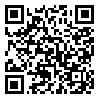BibTeX | RIS | EndNote | Medlars | ProCite | Reference Manager | RefWorks
Send citation to:
URL: http://journal.muq.ac.ir/article-1-1021-en.html

 , Roohollah Farhadloo *
, Roohollah Farhadloo * 
 2, Mostafa Vahedian3
2, Mostafa Vahedian3 
 , Mahdi Kashaninejad4
, Mahdi Kashaninejad4 
 , Laleh Hasanpoor5
, Laleh Hasanpoor5 
 , Siamak Mohebi6
, Siamak Mohebi6 

2- Emergency Medical Center, Qom University of Medical Sciences, Qom, Iran. ,
3- Modeling in Health, Institute for Futures Studies in Health, Kerman University of Medical Sciences, Kerman, Iran.
4- Emergency Medical Center, Qom University of Medical Sciences, Qom, Iran
5- Rajaie Cardiovascular Research Center & Therapy, Iran University of Medical Sciences, Tehran, Iran.
6- Faculty of Public Health, Qom University of Medical Sciences, Qom, Iran.
Background and Objectives: Education is one of the fundamental pillars of development of capabilities, skills, and competencies in different sectors of society. Application of modern education methods seems to be necessary due to rapid changes of social requirements. The aim of this study was to compare the effects of scenario and lecture-based education methods on knowledge and attitude of emergency medical technicians towards patients with chest trauma.
Methods: A total of 160 emergency medical technicians were participated in this quasi-experimental research. The participants were divided into two groups of scenario- and lecture-based education. Required information were collected by knowledge and attitude questionnaire before and after the intervention. Data were then analyzed by paired t- and chi-square tests.
Results: The mean of knowledge (p<0/001) and attitude (p<0.001) scores significantly increased in the scenario-based education group.
Conclusion: Considering the effect of scenario-based education and its role in utilization of learner’s intellectual capability and creativity, it seems that scenario-based education is an appropriate alternative for traditional education methods.
Received: 2016/07/19 | Accepted: 2016/07/19 | Published: 2016/07/19
| Rights and permissions | |
 |
This work is licensed under a Creative Commons Attribution-NonCommercial 4.0 International License. |





